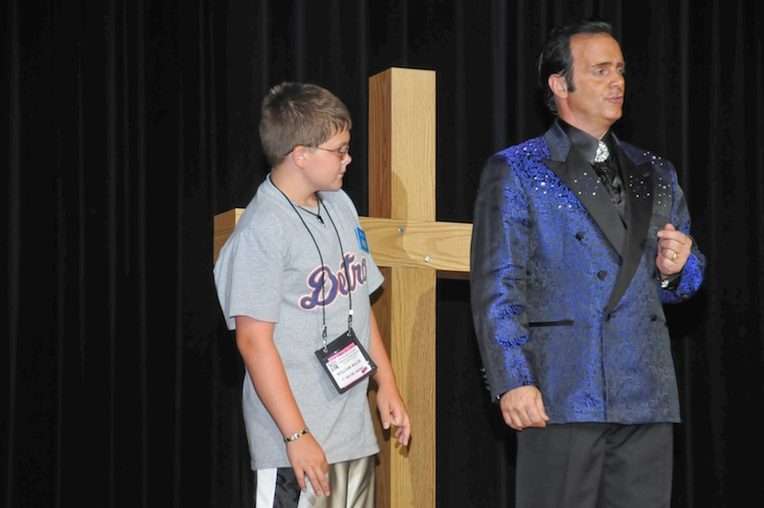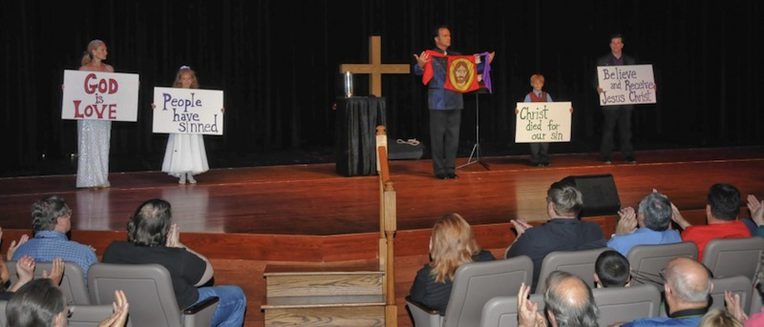This post builds on the research article “Magic with a Message: The Poetics of Christian Conjuring,” which was published in the May 2012 issue of the Society’s peer-reviewed journal, Cultural Anthropology.

Editorial Footnotes
Cultural Anthropology has published a number of articles on performance, including Chris Garces’s “The Cross Politics of Ecuador’s Penal State” (2010), Jesse Weaver Shipley’s “Comedians, Pastors, and the Miraculous Agency of Charisma in Ghana” (2009), and Jeffrey G. Snodgrass’s “Imitation Is Far More Than the Sincerest of Flattery: The Mimetic Power of Spirit Possession in Rajasthan, India” (2002).
Cultural Anthropology has also published articles on Evangelical Christianity. See for example, William E. Connolly’s “Some Theses on Secularism” (2011) and Omri Elisha’s “Moral Ambitions of Grace: The Paradox of Compassion and Accountability in Evangelical Faith-Based Activism” (2008).
Interview with Graham Jones
How did you first become interested in the anthropology of magic and conjuring, and how did that lead you to Christian magicians?
It was an interest in knowledge transmission that first led me to magic. I was taking a graduate seminar on socialization, and did a final project focusing on the transmission of a trick from an expert to a novice magician. I had never thought much about magic before that (although my father subsequently excavated a letter I wrote to Santa Claus requesting a magic set). When my partner and I transcribed and analyzed this lesson, we were astounded by the sophisticated grasp on cognition, perception, and interaction embedded in what seemed to be a simple trick. So I wanted to find out more about the subculture in which that kind of expertise developed and circulated.
Several years later, I carried out fieldwork among entertainment magicians in contemporary France. Coming from a background in symbolic anthropology, I was very interested in the way meaning might emergence their performances, but they generally didn’t assess the efficacy of their illusions in terms of meaning, at least not in any straightforward way. When I learned about gospel magic, I was fascinated to discover that there was an alternate realm of conjuring in which people were very self-consciously embedding magical illusions in deliberate meaning-making activities.
There seems to be an irony in the situation you describe, where the secularization of magic has led to re-appropriation by Christian magicians to spread the gospel. Do you see this as a matter of historical chance or as reflective of the relationship between secular society and Evangelical Christianity?
That’s a great question. Employing tricks as a signifying medium in a Christian context along the lines of what gospel magicians do would be almost unthinkable if magic in Western culture had not be so thoroughly disenchanted and demystified. Approaching this project, I thought that magic’s dangerous associations with the occult and supernatural would continue to dog gospel magicians, but it isn’t nearly as big an issue as I thought. They acknowledge it, try to dispel any misconceptions, and get on with the show, so to speak. They can count on audiences to be familiar with conventions of modern, Western magic established in the eighteenth and nineteenth centuries, whereby tricks always have mechanistic explanations. So that’s the historically contingent part. The more complicated issue concerns how the disenchantment of magic intersects with the reenchantment of American religious revivalism. Here I think you have to look at how magic is situated alongside other genres of mass and popular culture (music, cinema, photography…) that Christians have reconfigured as mediums for witnessing. There is a fascinating relationship between secular culture and the expressive potential of the gospel, which Evangelicals cultivate in tremendously creative ways.
You make explicit the tension between a magic trick's indexicality of the magicians skill, and its iconicity of Christian themes. What is striking is how the people you talked to agonize over this tension, some even leaving the practice for a time. Do you see this semiotic explanation as applicable to understanding the position of other Evangelical professionals and performers, where ambition is confronted with the religious prescript to be humble?
Entirely. I don’t think magic is unique in this regard. I have seen Christian performers in other genres wrestle in creative ways with the dangers of self-glorification, and colleagues have informed me that preachers struggle with them too. One could look at Richard Bauman’s work on the early Quakers to see how similar anxieties about the moral pitfalls of spiritual leadership unfold in an entirely different Protestant context. I think what’s interesting about my particular case is that I’m in a position to contrast the elaboration of agency in a secular and a Christian approach to magic. In secular magic, the manifestation and amplification of the performer’s individual agency is one of the genre’s central prerogatives. Look at a figure like Harry Houdini, the archetypal American magician: each successive spectacle was carefully conceived to showcase skill, strength, daring, and virtuosity in his never-ending process of self-apotheosis. In a way, gospel magicians are participating in this same genre but they’re also at war with some of its organizing conceits. I find that fascinating!
Can you talk briefly of what it was like to work with this community? Were you approached as a researcher of magic or as a researcher of Christianity? In conversation, did one topic always lead to the other, or could each be discussed separately?
Working with this community was a wonderful experience. In all my conversations, I tried to present myself as honestly as possible. I explained that had already done extensive research on secular magic, where conveying a message isn’t particularly important to most performers, and that this got me interested in studying a form of magic in which conveying a message is the paramount concern. This seemed to make perfect sense to all the gospel magicians I spoke with, because they are equally familiar with the secular magic world. In that sense we had a lot of common ground.
What deeply impressed me (and I think this is reflected in the article) is that the gospel isn’t just a message these performers append to otherwise indifferent tricks. It’s a message that they strive to embody and enact in every aspect of their lives, including magic. I had the same kind of experience that Susan Harding describes in which conversations I approached as “interviews” they approached as “witnessing.” While I had some great discussions about magic, most of the gospel magicians were much more concerned with my own salvation than with whatever research I might be doing. They always brought the conversation back to that.
Are you still working with this community? Where do you see this project headed in the future?
I don’t have any immediate plans to continue working with gospel magicians, though I would be more than happy to if the opportunity arose! I think it would be hard to write a book about gospel magic without tackling some of the neighboring genres of creative ministry. For me, this article is part of a series of projects I want to do addressing forms of magic that blur boundaries between entertainment and ritual. Ultimately I’m hoping to write a book reexamining the famous relationship between magic, science, and religion not so much from the habitual perspective of belief, but from the more idiosyncratic perspective of performance. In a variety of cultural settings conjuring interacts with all of these categories in intriguing ways, and I’m hoping to investigate how it might play a role in constituting them.

Questions for Classroom Discussion
1. How do Christian magicians use of iconicity allow them to give witness to Christ? What are the pitfalls that are innate to their method?
2. In what sense are the virtues needed to be a good magician and those needed to be a good Christian opposed to each other? How do the magicians look to reconcile them?
3. Jones characterizes the Evangelical magician as having to posses spiritual virtue and semiotic virtuosity in addition to the "manual skill the magician might need to produce and effect." To what extent does this fundamentally change the nature of the performance, as compared to secular magicians?
4. To what extent can spiritual virtue be separated from its semiotic representations? Is the ability to correctly represent one's faith best understood as a skill that comes secondary to one's actual beliefs, or are the two inextricably intertwined?
Related Readings
Briggs, Charles L., and Richard Bauman. "Genre, Intertextuality, and Social Power." Journal of Linguistic Anthropology 2.2(1992):131–172.
Chidester, David. Authentic Fakes: Religion and American Popular Culture. Berkeley: University of California Press, 2005.
Elisha, Omri. "Faith beyond Belief: Evangelical Protestant Conceptions of Faith and the Resonance of Anti-Humanism." Social Analysis 52.1(2008):56–78.
Harding, Susan Friend. The Book of Jerry Falwell: Fundamentalist Language and Politics. Princeton: Princeton University Press, 2000.
Jones, Graham M. "Modern Magic and the War on Miracles in French Colonial Culture." Comparative Studies in Society and History 52.1(2010):66–99.
_______. Trade of the Tricks: Inside the Magician’s Craft. Berkeley: University of California Press, 2011.
Keane, Webb "Semiotics and the Social Analysis of Material Things." Language and Communication 23.3–4(2003):409–425.
Lamont, Peter, and Richard Wiseman. Magic in Theory: An Introduction to the Theoretical and Psychological Elements of Conjuring. Hertfordshire: University of Hertfordshire Press, 1999.
Luhrmann, Tanya M. "Metakinesis: How God Becomes Intimate in Contemporary U.S. Christianity." American Anthropologist 106.3(2004):518–528.
Mangan, Michael. Performing Dark Arts: A Cultural History of Conjuring. Chicago: Intellect, 2007.
Robbins, Joel. "The Globalization of Pentecostal and Charismatic Christianity." Annual Review of Anthropology 33(2004):117–143.